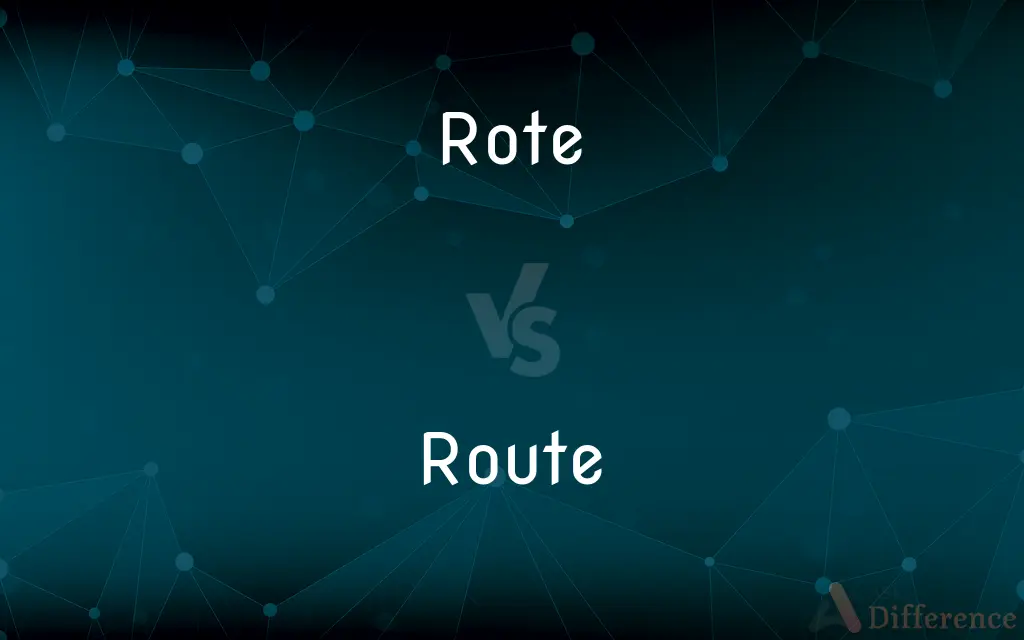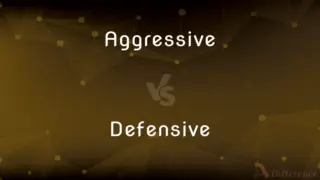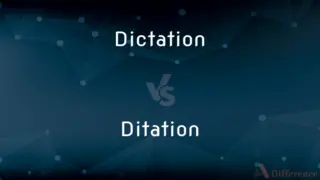Rote vs. Route — What's the Difference?
By Tayyaba Rehman & Maham Liaqat — Updated on March 28, 2024
Rote refers to mechanical or habitual repetition of something to be learned, while route is a way or course taken in getting from a starting point to a destination.

Difference Between Rote and Route
Table of Contents
ADVERTISEMENT
Key Differences
Rote learning is a memorization technique based on repetition, often used to learn facts, figures, or basic skills without understanding the underlying principles. This method is characterized by repetition of material, such as formulas, definitions, or foreign language vocabulary, with the goal of embedding information directly into memory. On the other hand, a route is a specific path or direction followed to reach a destination. It can refer to physical travel paths, like roads or trails, or to abstract sequences of steps in a process or plan. While rote focuses on the method of learning, route is concerned with the direction or pathway taken to achieve a physical move or strategic goal.
Rote learning has its place in education, especially in the early stages of learning or in situations where memorization of data is crucial, such as multiplication tables or historical dates. However, it is often criticized for lacking depth and not promoting critical thinking or understanding. Conversely, choosing a route involves decision-making based on criteria such as distance, time, or scenic value, and can apply to various contexts, from navigation to project planning.
The effectiveness of rote learning versus understanding-based learning (often contrasted with rote) is a subject of educational debate. Rote can efficiently instill foundational knowledge, but integrating this knowledge meaningfully into one’s cognitive framework usually requires higher-order thinking skills. In contrast, selecting a route, whether literally or figuratively, requires evaluation of alternatives and decision-making based on desired outcomes or preferences.
In digital and abstract contexts, "route" can also refer to the path taken by data packets across the internet or the steps in a workflow process, emphasizing the concept of directed movement towards an endpoint. Rote, by its nature, remains primarily associated with the realm of learning and memorization, without direct implication of physical or abstract movement.
Comparison Chart
Definition
Memorization technique based on repetition
Path or direction followed to a destination
ADVERTISEMENT
Application
Learning facts, figures, or skills
Navigation, planning, data transmission
Key Characteristics
Repetition without understanding the principles
Decision-making based on criteria like distance
Criticisms
Lacks depth and understanding
Choice of route can be inefficient or risky
Contexts
Educational settings, early learning
Travel, logistics, project planning, internet data
Compare with Definitions
Rote
Often used for memorizing facts.
Students often use rote memorization for historical dates.
Route
A specific path from one place to another.
The GPS calculated the fastest route to the beach.
Rote
Learning by repetition without understanding.
She learned the poem by rote for the competition.
Route
Can refer to data transmission paths.
The router manages the route of data packets across the network.
Rote
Criticized for lack of comprehension.
Critics argue that rote learning stifles creativity.
Route
Involves decision-making.
Planning a road trip requires choosing scenic routes.
Rote
Focuses on memorization technique.
Rote learning is a common early education tool.
Route
Applies to abstract sequences.
The project manager outlined a route to completion.
Rote
Can be effective for foundational knowledge.
Rote methods are effective for learning multiplication tables.
Route
Used in travel and logistics.
Delivery companies optimize routes for efficiency.
Rote
A memorizing process using routine or repetition, often without full attention or comprehension
Learn by rote.
Route
A road, course, or way for travel from one place to another
The route from Maine to Boston takes you through New Hampshire.
Ocean routes that avoided the breeding grounds of whales.
Rote
Mechanical routine.
Route
A highway
Traveled on Route 12 through Michigan.
Rote
The sound of surf breaking on the shore.
Route
A fixed course or territory assigned to a salesperson or delivery person.
Rote
A medieval stringed instrument variably identified with a lyre, lute, or harp.
Route
A means of reaching a goal
The route to success required hard work.
Rote
Mechanical routine; a fixed, habitual, repetitive, or mechanical course of procedure.
The pastoral scenes from those commercials don’t bear too much resemblance to the rote of daily life on a farm.
He could perform by rote any of his roles in Shakespeare.
Route
(Football) A pass pattern.
Rote
(rare) The roar of the surf; the sound of waves breaking on the shore.
Route
To send or forward by a specific route.
Rote
(musical instrument) A kind of guitar, the notes of which were produced by a small wheel or wheel-like arrangement; an instrument similar to the hurdy-gurdy.
Route
A course or way which is traveled or passed.
The route was used so much that it formed a rut.
You need to find a route that you can take between these two obstacles.
Rote
Synonym of crowd.
Route
A regular itinerary of stops, or the path followed between these stops, such as for delivery or passenger transportation.
We live near the bus route.
Here is a map of our delivery routes.
Rote
By repetition or practice.
Route
A road or path; often specifically a highway.
Follow Route 49 out of town.
Rote
(obsolete) To go out by rotation or succession; to rotate.
Route
(figuratively) One of multiple methods or approaches to doing something.
Rote
(transitive) To learn or repeat by rote.
Route
(historical) One of the major provinces of imperial China from the Later Jin to the Song, corresponding to the Tang and early Yuan circuits.
Rote
A root.
Route
(computing) A specific entry in a router that tells the router how to transmit the data it receives.
Rote
A kind of guitar, the notes of which were produced by a small wheel or wheel-like arrangement; an instrument similar to the hurdy-gurdy.
Well could he sing and play on a rote.
Extracting mistuned dirges from their harps, crowds, and rotes.
Route
(horse racing) A race longer than one mile.
Rote
The noise produced by the surf of the sea dashing upon the shore. See Rut.
Route
(transitive) To direct or divert along a particular course.
All incoming mail was routed through a single office.
Rote
A frequent repetition of forms of speech without attention to the meaning; mere repetition; as, to learn rules by rote.
Till he the first verse could [i. e., knew] all by rote.
Thy love did read by rote, and could not spell.
Route
(Internet) to connect two local area networks, thereby forming an internet.
Rote
To learn or repeat by rote.
Route
To send (information) through a router.
Rote
To go out by rotation or succession; to rotate.
Route
The course or way which is traveled or passed, or is to be passed; a passing; a course; a road or path; a march.
Wide through the furzy field their route they take.
Rote
Memorization by repetition
Route
An established line of travel or access
Route
An open way (generally public) for travel or transportation
Route
Send documents or materials to appropriate destinations
Route
Send via a specific route
Route
Divert in a specified direction;
Divert the low voltage to the engine cylinders
Common Curiosities
Why is rote learning criticized?
Rote learning is criticized for not fostering a deeper understanding or critical thinking skills, as it involves memorization without comprehension.
What is rote learning good for?
Rote learning is useful for memorizing factual information, basic skills, and foundational knowledge where understanding the underlying principles may not be immediately necessary.
How do you determine the best route to a destination?
Determining the best route involves considering distance, traffic, the nature of the terrain, and personal preferences or goals for the journey.
When might one choose a specific route?
One might choose a specific route based on factors like speed, safety, scenic value, or efficiency, depending on the context of travel or task execution.
How does technology affect route planning?
Technology, through GPS and mapping software, has significantly improved the ease and accuracy of route planning, offering real-time data and optimization options.
How can one improve their ability to learn beyond rote memorization?
Improving beyond rote memorization involves engaging with material in a more meaningful way, through practices like application, analysis, synthesis, and reflection.
Can rote learning lead to understanding?
While rote learning focuses on memorization, it can lay the groundwork for deeper understanding when combined with more comprehensive learning strategies.
Is there a place for rote learning in modern education?
Yes, rote learning still has a place in modern education, particularly for learning basic facts and figures that serve as building blocks for more complex knowledge.
What factors might affect route choice in logistics?
In logistics, route choice can be affected by factors such as delivery times, fuel efficiency, road conditions, and regulatory restrictions.
Can routes be applied to non-physical paths?
Yes, the concept of routes can apply to abstract paths as well, such as steps in a process or data transmission paths in networking.
Share Your Discovery

Previous Comparison
Aggressive vs. Defensive
Next Comparison
Dictation vs. DitationAuthor Spotlight
Written by
Tayyaba RehmanTayyaba Rehman is a distinguished writer, currently serving as a primary contributor to askdifference.com. As a researcher in semantics and etymology, Tayyaba's passion for the complexity of languages and their distinctions has found a perfect home on the platform. Tayyaba delves into the intricacies of language, distinguishing between commonly confused words and phrases, thereby providing clarity for readers worldwide.
Co-written by
Maham Liaqat













































